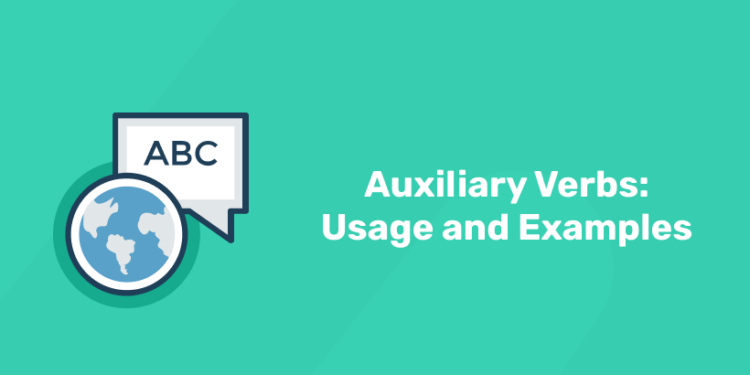Table of Contents
The auxiliary verb is a verb that is used as a helping verb along with the main verb in a sentence to make it more meaningful. It is used to alter the tense, mood or voice of the sentence.
Definition of an Auxiliary Verb
An auxiliary verb is “a verb such as be, do, and have used with main verbs to show tense, etc. and to form questions, and negatives”, according to the Oxford Learners’ Dictionary.
Elevate your speaking skills with our Spoken English Course!
The Macmillan Dictionary defines auxiliary verbs as “the verbs ‘be’, ‘do’, and ‘have’ in English, when they are used with another verb to form tenses, questions, question tags, and the passive. For example, in the sentences ‘I am listening’, ‘Are you working?’, ‘You don’t like her, do you?’ and ‘The bill has been paid’, ‘am’, ‘are’, ‘do’, and ‘has been’ are all auxiliaries.”
According to the Cambridge Dictionary, an auxiliary verb is “a verb that is used with another verb to form tenses, negatives, and questions. In English, the auxiliary verbs are- ‘be’, ‘have’, and ‘do’.”
Examples of Auxiliary Verbs
1: Which of the sentences below is grammatically correct?
Here is a list of auxiliary verbs that you can use along with the other main verbs to perform the different functions of an auxiliary.
- Am
- Is
- Are
- Was
- Shall
- Should
- Do
- Did
- Were
- Have
- Has
- Must
- Ought to
- Need Had
- Will
- Would
- May
- Might
- Can
- Could
Spoken English Course for Guaranteed Confidence and Career Growth
Spoken English Course by Entri App: Enhance your communication skills, gain certification, and boost your career with confidence.
Join Now!How are auxiliary verbs used in sentences?
Auxiliary verbs are always used along with a main verb to indicate tense, mood, and voice. Auxiliary verbs typically come before the main verb in a sentence.
The primary auxiliary verbs are- be, have, and do. Some sentences (e.g., those in the perfect continuous tenses) contain more than one auxiliary verb.
Examples:
Ram is talking to Laxman.
Jim has already eaten dinner.
Did you go to school yesterday?
Modal auxiliary verbs
Modal auxiliary verbs (also called simply modal verbs) help to clarify the context of a sentence. They express possibility (e.g., “might”), ability (e.g., “can”), permission (e.g., “may”), and necessity (e.g., “must”). The modal verb “will” is used to form all future tenses.
While regular auxiliary verbs follow subject-verb agreement, modal auxiliary verbs never change form. In sentences containing modal verbs, the main verb typically takes the infinitive form (e.g., “he can sing”).
Examples:
I would expect nothing less.
We should schedule an meeting with the preferred clients.
Shall we order lunch?
Auxiliary verbs and tense
Conjugated forms of the auxiliary verbs “be” and “have” are used in various verb tenses to help indicate time. In the future tense, the modal auxiliary verb “will” is also used.
Below is a table that shows the conjugated forms of the verb “read” in the first person singular. The table illustrates the use of auxiliary and modal verbs in creating the progressive, perfect, and perfect progressive aspects.
| Tables | |||
| Past | Present | Future | |
| Progressive | I was writing. | I am writing. | I will be writing. |
| Perfect | I had written. | I have written. | I will have written. |
| Perfect progressive | I had been writing. | I have been writing. | I will have been writing. |
Join our Spoken English program today and communicate with ease!
Auxiliary verbs and mood
The grammatical mood of a verb indicates the tone and intention of a sentence. Auxiliary verbs and modal verbs are used along with a main verb to express grammatical mood.
| Tables | ||
| Grammatical mood | Function | Example |
| Indicative | State a fact | “Raj is sleeping.” |
| Imperative | Express a command or a request (often with a negative auxiliary verb) | “Don’t break anything.” |
| Interrogative | Ask a question | “Have you gone crazy?” |
| Conditional | Express a condition | “You can use my pencil if you need to.” |
| Subjunctive | Express a wish, doubt, or hypothetical situation | “If I were more creative, I would play music.” |
Auxiliary verbs and the passive voice
Passive constructions (i.e., sentences in which the subject is the recipient of the action) use a conjugated form of the auxiliary verb “be” along with the past participle of the main verb. Sometimes, sentences in the passive voice also contain a prepositional phrase indicating the person or thing performing the action.
Example: Auxiliary verbs in a passive sentence
The boy was bitten by a snake.
Other uses of auxiliary verbs
Auxiliary verbs have various other functions in English. They can be used:
Question tags
Question tags are used at the end of a sentence to ask whether a preceding statement is true. If the main statement is positive, the question tag should use a negative auxiliary verb. If the main statement is negative, the question tag should use a positive auxiliary verb.
Question tags use the same auxiliary verb as the main statement. They also refer to the same subject. However, they always use subject pronouns (e.g., “I,” “he,” “she,” “we”).
Examples:
Pinky is coming to the party, isn’t she?
To avoid repetition
Auxiliary verbs are often used to avoid repeating the main verb in a sentence. Instead, a conjugated form of the main statement’s auxiliary verb is used along with the coordinating conjunction “but” and the relevant noun or pronoun. If the main statement is positive, the second statement should use a negative auxiliary verb, and vice versa.
Examples:
I don’t really like soccer, but Emaan does. [she does like soccer]
Negative statements
Most negative statements are formed by adding the adverb “not” between the auxiliary verb and the main verb (or after the first auxiliary verb if the sentence contains more than one).
Examples:
I am not going to the wedding.
Emphasis
In everyday conversation, people sometimes place emphasis on an auxiliary verb to refute or contradict a previous statement or question. When written down, the emphasized word is often italicized.
Examples:
Why aren’t you studying?
I am studying!
Important Points to remember
- When using the forms of ‘to be’, make sure you use the gerund (verb+ing) form of the main verb as they are used to indicate continuous action.
- When using forms of ‘have’, see to it that you use the past participle forms of the main verbs along with the different forms of ‘have’. There is one other thing that you should keep in mind. When the auxiliary verbs ‘have’ and ‘been’ are used together to represent the perfect continuous tense, see to it that you use the gerund (verb+ing) form of the main verb in that particular sentence.
- When using the auxiliary verb ‘will’ to denote the simple future tense, see to it that you use the root verb as such along with ‘will’ and a gerund (verb+ing) along with ‘will be’ to indicate the future continuous tense. Make sure you employ the past participle form of the main verb when it is used to indicate the future perfect tense along with the auxiliary verbs, ‘will’ and ‘have’.
Let us look at the following examples to learn how to use them in sentences effectively.
| Root Verb | Auxiliary Verb | Tense Form | Examples |
| To be | Am | Present Continuous (Singular) | I am watching the movie. |
| Is | Present Continuous (Singular) | She is having his lunch. | |
| Are | Present Continuous (Plural) | They are going to Dessert. | |
| Was | Past Continuous
(Singular) |
Sam was having lunch. | |
| Were | Past Continuous
(Plural) |
The children were playing Pictionary. | |
| Have | Have | Present Perfect | They have come to Dubai after four years. |
| Has | Present Perfect (Third person pronoun – ‘He’, ‘She’ and ‘It’) | Tabish has finally found the keys to his car. | |
| Had | Past Perfect | Nani and Vani had brought their pet along with them when they came to have dinner with us. | |
| Have been | Present Perfect Continuous | I have been waiting for my interview results since last week. | |
| Has been | Present Perfect Continuous
(Third person pronoun – ‘He’, ‘She’ and ‘It’) |
Fahim has been working as a doctor in lucknow for a year now. | |
| Had been | Past Perfect Continuous | Heera and Diana had been waiting to visit the Museum of Fine Arts from the day they reached Bangalore. | |
| Will | Will | Simple Future | I assure you that I will finish all my assignments by Friday. |
| Will be | Future Continuous | She will be attending the Parent-Teacher meeting next week. | |
| Will have | Future Perfect | They will have reached London by this time tomorrow. |
Auxiliary Verbs used to Alter the Voice of the Verb
All forms of ‘to be’, ‘have’ and ‘will’ can be used as auxiliary verbs to represent the voice of the verb in a sentence. Let us look at some examples of how these auxiliary verbs can be used.
| Root Verb | Auxiliary Verb | Examples |
| To be | Is | Football is played by Gam. |
| Are | Ice creams are liked by most children. | |
| Was | Any sort of amendments to the bill was refused by the judge. | |
| Were | The documents for the loan proposal were being checked by the banking officials. | |
| Have | Have been | All the relatives have been invited to the birthday party by Rohan. |
| Has been | He has been checked by the doctor. | |
| Had been | The workers had been sent to protest against low wages by the company. | |
| Will | Will be | The bus will be boarded by me at 10:30 p.m. tonight. |
| Will have | The solution to the problem will have been delivered by the authorities, this time tomorrow. |
Start speaking English like a native with our comprehensive course.
Spoken English Course for Guaranteed Confidence and Career Growth
Spoken English Course by Entri App: Enhance your communication skills, gain certification, and boost your career with confidence.
Join Now!Modal Auxiliary Verbs usage
Modal auxiliary verbs can be used as helping verbs along with other main verbs to emphasise on the possibility, ability, necessity or probability of some action taking place.
| Modal Auxiliary Verb | Examples |
| Can | Can you do it? |
| Could | I could find some time to finish it by tomorrow. |
| May | She may have liked your style. |
| Might | Suresh might be able to help you with it. |
| Will | Anu will solve the puzzle. |
| Would | Would you like to have some pizza? |
| Should | The children should keep themselves active. |
| Must | You must try the Dragon Chicken from China Valley. |
| Ought to | You ought to abide by the rules set by the organisation you are a part of. |
| Shall | I shall be obliged to you for all your help. |
Test Your Knowledge on Auxiliary Verbs and Their Usage
Try out the following practice exercise to find out how far you have understood the usage of auxiliary verbs in sentences.
Fill in the blanks with the appropriate auxiliary verb:
- Lichi ______ eating an apple pie.
- _____ you finish the work I _____ given you on Monday?
- _________ you please pass the logbook?
- You _________ follow the rules.
- Your laptop ___________ damaged.
Ready to find out if you got it all right? Check your answers.
- Lichi is/was eating an apple pie.
- Did you finish the work I had given you on Monday?
- Could/Can you please pass the logbook?
- You should/ought to follow the rules.
- Your laptop should be damaged.
Join our Spoken English program today and communicate with ease!
Frequently Asked Questions
1. What is an auxiliary verb?
Ans. An auxiliary verb is a verb that is used as a helping verb along with the main verb in a sentence to make it more meaningful. It is used to alter the tense, mood, or voice of the sentence.
2. Give some examples of auxiliary verbs.
Ans. Am, is, are, was, were, will, have, has, had, may, might, can, could, shall, should, must, ought to, would, etc., are some examples of auxiliary verbs.
3. What are modal auxiliary verbs?
Ans. Modal auxiliary verbs are a subtype of auxiliary verbs used to show modality, such as making a suggestion.










